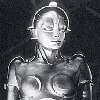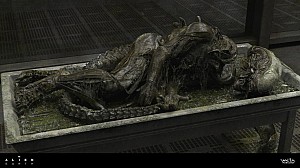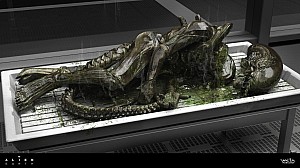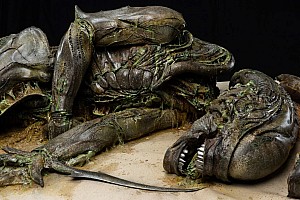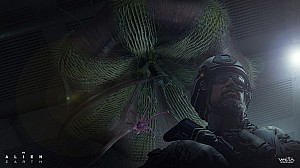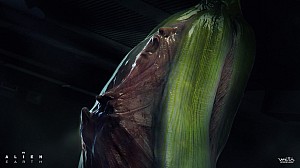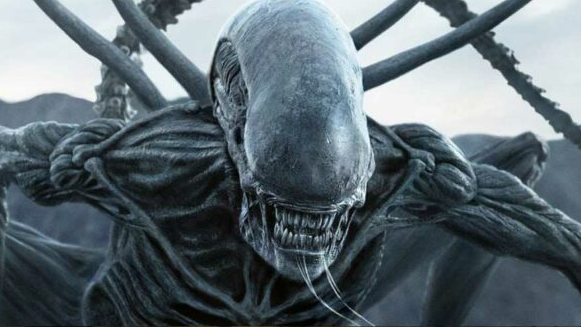craigamore reviews Prometheus - I LIKED, but DID NOT love this film....SPOILERS
Prometheus Forum Topic
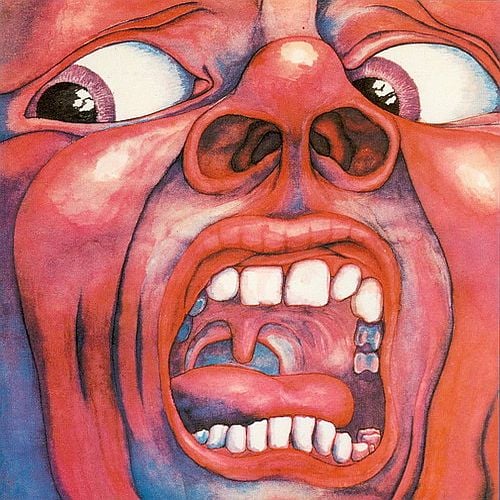
craigamore
MemberOvomorphJun 10, 20123060 Views33 RepliesWhere to begin?......
After waiting for so long for Ridley's return to this universe.....I must say that my feelings are mixed. [i]Prometheus[/i] [b]IS[/b] a good film, but a masterpiece it is not.
I found the story interesting and the concepts held within rather fascinating. Indeed, I LOVED the centralized concepts of this film, yet I found the execution lacking..
To fully explain myself, I will detail the spinal column of what I LOVED in this story as I saw it and explain why I loved that rather the film as a whole:
- The engineers created us. That much is clear. The possibility exists, indeed, the question is raised - Who may have created them? Ironically, this leaves interpretation open to faith inspite of what the crew of the Prometheus finds.
- The engineers revealed themselves periodically to our earliest cultures for a period lasting at least 33,000 years. Around 2000 years ago, they decided, for whatever reason, that our time was up and, as David puts it, "To create, sometimes, you must first destroy." Hence, the nature of the installations found on LV-223. They are obviously of military purpose. Janek's hypothesis is logical and follows based on the nature of the bio-weapons they discover there. A friend of mine wondered, and I found the concept interesting, that perhaps the emergence of Christianity was the engineers' reasoning for deciding to wipe us out. My friend went on to suggest that perhaps the emergence of monotheism on the whole was the genisis of our intended demise, but monotheism came about long before Christianity began, so I wonder if that is spefically the focus there...this is however, not clear.
- The engineers fall prey to their own creations; i.e. no one can hope to control these things. This a theme carried over from [i]Alien[/i], the original film as well as the franchise as a whole - embodied not only by the fate of the original SpaceJockey with his exploded chest, but also in Ash's dieing speech, “a perfect organism. Its structural perfection is matched only by its hostility…a survivor, unclouded by conscience, remorse, or delusions of morality.”
- I noticed that many have been upset in their reviews that they did not get answers concerning the original derelict. The why of it being there and such. I'm baffled by this frustration as I found that answer to be rather clear. It isn't spoken of or delivered directly as no one present would know of its fate. How could they? But the answer is found and readable between the lines if you paid attention. Given that the engineers had decided our fate, Shaw exclaims to David's severed head, forgive me for paraphrasing for a lack of clear memory, "that something must have stopped them, changed their minds." In that moment, it hit me, THEY NEVER DID CHANGE THEIR MINDS; especially when you consider the engineer's reaction to their presence. What I'm getting at is the notion that they DID SEND A SHIP TO WIPE OUT LIFE ON EARTH...and it never made it's full journey. An egg was disturbed, perhaps we'll never know, but once again, whatever the reason for that derelict setting down on LV-426, be it mechanical issues and an egg was then disturbed or the disturbing happened in flight, forcing it to set down - chicken first or the egg - it doesn't matter and is still left to our imagination. I liked that notion.
- This Bioformer fluid seen throughout is designed for particular effect - an effect that ultimately leads to the classic xenomorph as we know it. Yet this effect is not singular. Whatever it is, it's meant to manipulate the biology of whatever it comes in contact with. It's purpose is to imbue that biology with biomechanical characteristics suiting the intended purpose - weaponizing whatever it comes into contact with. And each new biology is affected differently depending on its own make up as well as the nature in which it comes into contact with the bioformer fluid.
The worms seen in the ampule chamber grow in hostility and size exponentially, gain heads along with tails that remotely resemble the body structure of the classic facehugger as well as having acid for blood.
Fifield comes into contact with the fluid externally and it causes mutation on a massive scale. He becomes unnecessarily hostile (I use unnecessarily as I found his attack on the crew to be random and without motive). His strength, agility and speed increase to inhuman levels and he becomes ridiculously difficult to kill.
David poisons Holloway with bioformer internally and the effect on human physiology changes, which I found interesting. Ingestion causes a gestation that seems to accelerate with time. He feels nothing at first, sees a wormlike protusion in his eye as the infection takes hold and he quickly deteriorates thereafter. Now, we never see what the final result would be, but what makes this permutation interesting is that he remains lucid until the end, even begging Vickers to kill him; knowing intuitively that his continued survival will result in NOTHING good. That he is lucid is a distinct difference between what happens to him and what happens to Fifield. That's important to note considering what happens next.
During the coarse of his transformation, Holloway passes on his genetic malformation to Shaw through intercoarse and she is impregnated. Given that the viewer is told that she cannot bear children, it is odd that whatever he passed to her managed to bond with an egg and grow at all. I'm no doctor, but the leap in that issue is, I guess, explainable in the aggresive nature of the bioformer, which also allows for the rapid development of her "fetus". When born it grows into a massive proto-facehugger or bodyhugger. After the engineer is impregnated, he gives birth to the progenitor of our classic xenomorph as we know it...[i][b]WHICH I WAS UNHAPPY WITH.[/b][/i]
Notice also, this culmination in a progenitor of the xenomorph is suggested as the ultimate final result of the bioformer's intended purpose by the mural of the xenomorph that Holloway views before declaring, "This place is a tomb."
EDIT: The Bioformer fluid may have been meant for distribution in humanity's water supplies, which would then have led to exponential spread of the affect we see with Hollway and Shaw on the human population of earth and the resultant Progenitor of the xenomorph spreading everywhere.
[img]http://i46.tinypic.com/2zfqpzs.png[/img]
- David's malevolent rebellion against his creators was rather interesting. Fassbender's performance was brilliant and despite questions friends of mine had as to the logic of his motives, I found no issue there. From moment one and particularly following Weyland's callous rejection of David's substance as a sentient being, David oozes a beautifully sarcastic pleasantry that makes him all the more menacing. The sabotage he engages himself in is fascinating in that the audience can see he plainly exhibits the emotional states he is frequently disrespected as supposedly not having by his mere artificiality as a man made being. That fact alone is of particular import to David's motives as none of the human crew sees the irony of themselves having been created by "higher" beings and yet, they experience emotion themselves. David resents this hypocracy and it, in his mind, justifies his actions. David's words to the engineer are perhaps the most interesting development of his character as we have NO IDEA what he is saying or the implications of those words - all we have is the aftermath and even that gives us nothing definitive. Also, I believe he knows exactly what the ampule room is when he opens the door to it. He knows exactly what he he's doing and the horror it will lead to.
EDIT: As the arrival at LV-223 approaches, we witness David's routine, what appears to be the outgrowth of his daily life over the previous 2 years, some 17,520 plus hours of the only real freedom he has probably ever known. It is a sequence in which we see an [b]individual[/b], and I do stress that term, that shows at the very least a mild interest in sports (the bicycle/basketball scene), an interest in and, particulary, a love of one film ([i]Lawrence of Arabia[/i]); a film he enjoys so much as to emulate its hero by dying his hair bleach blonde as well as styling it in that fashion. The point I am driving at is that David, for all his creators' assumptions of his lack of feeling, undestanding or appreciation, clearly exhibits evidence to the contrary. Given this, one logically accepts he FEELS emotion on some level. The opening sequence is meant for our understanding of this state of David's being. Given that his incept date is likely to have been only a short period before the expedition's departure, he has had little life experience to grow into that emotional existence and would not experience it as the average human would for his relative age (a man appearing to be in his 30's) or his clearly high level of intelligence. David's motive then appears to stem from a clear resentment of his creators' general level of indifference to his identity as a valid individual of emotional, intellectual and sentient relevance that is as much due him as any human. This resentment is apparent in almost every interaction he has with members of the crew throughout the film and stands as a clear and valid reasoning behind the motive for his actions. Given the irony I stated earlier about the duality of this situation: humans meeting their makers and not understanding their creators' sentiments towards them and not seeing that relationship between themselves and David. It's easy to see where David's pathology lies as well as his motive for severing his allegence to his creators. I loved that element of this film.
Those were the ideas I found interesting, what I truly enjoyed about the film.
[i][b]I liked Prometheus. I DID NOT love it as what I saw was flawed. It WAS NOT HORRIBLE, but it was no masterpiece either.[/b][/i]
Visually, the film is stunning, but everybody says that.
On to my issues with it:
I'm torn over the score. It's not a bad score. It's quite good actually, but not quite right for [i]Prometheus[/i]. Tonally, it completely misses the mark. Sure, this film is about grand ideas, but even so, the imagery we as an audience are meant to be confronted with, grandeur is all wrong; skin crawling obscurity would have fit and FELT propper, which Streitenfeld's fails on many occassions to accomplish. What amazes me here is that is causes an instant recollection of what occured with the score of [i]Alien[/i]. Goldsmith wrote what Streitenfeld did. He composed grandeur, a romanticism of space that entirley misses the point. Goldsmith recalls in one DVD interview that he thought of [i]Star Trek[/i] in his composition. I find that terribly ironic considering how similar Streitenfeld's score feels in that regard and I've had others tell me that as well. Ridley was insistent on ensuring the music of [i]Alien[/i] fit the mood, rejecting much of Goldsmith's score, not because it was bad, but because it was all wrong for the unifying themes of the film. The same was true here and he missed that.
EDIT: In addition, after a few days of consideration, I've come to another conclusion that I think helps explain some of our frustration. From as far back as Thanksgiving, with the leak of the original teaser trailer, following through to March and the release four other trailers as well as several featurettes, we were, as an audience, sold a film with an emotional aesthetic that harkened back to the terrifying, skin crawling, ominous horror of [i]Alien[/i] by way of trailer music that was beautifully conceived, recorded and edited alongside visuals meant to excite and [i][b]unsettle[/b][/i]. The score of the actual film carried with it an emotional aesthetic of an entirely different kind, one of awe, grandeur and romanticism that none of us were prepared for given the nature of the trailer campaign. Emotionally, tonally, aesthetically, we as an audience were set up for an experience we were not to have. I think that element alone hurt [i]Prometheus[/i]' reception tremendously.
The editing left something to be desired. The pacing of this film seemed to lack attention to detail. It did not seem to flow properly at times and the film suffers for that. The film feels afflicted with this conspicuous absence of scenes we can't know the content of, but we FEEL that absence none the less. For all the credit I have given Ridley for [i]Alien[/i], I should have been singing the praises of Terry Rawlings all this time. The admiration was always there, but I simply neglected my attention to it. I have, over the last few years developed a level of respect for editors that I think most of us tend to lack, myself included for the longest time. The effect on the final product of any film is as much do to with the editor as the director, no matter what anyone says. As I recall from film school, I once saw a 6 minute short in eleven different cuts that had eleven entirely different takes on everything from story to character to pacing; eleven different films of different quality, originating from the same material. Interesting note: Ridley's two sci-fi masterpieces were edited by Terry Rawlings. [i]Prometheus[/i] was not....I wonder.....
As I said earlier, I was bothered by Fifield's massacre as it seems random and out of place. Granted, one of the intended and obvious affects of contact with bioformer is rampant hostility, but he seeks out the ship in his deranged state and doubles himself over for no real logical reason. It feels unnecessary, pointless and a means to bandage bad writing by bridging a story gap with pointless action.
EDIT: Fifield's massacre is illogical for reasons I will answer with a question: How does a deranged, crazed, no longer lucid mutation of a man find his way back to a ship HE COULD NOT FIND WHEN HE WAS STILL HUMAN, TERRIFED AND DESPERATE TO GET BACK? Had the massacre taken place inside the alien structure, due to the universal adaptation of aggression infused by the bioformer, the entire episode might have made more sense in the course of the story and not come off so poorly or as baffling as it now does.
Vicker's relationship with her "father" Weyland is dissappointing in that the specific line when she utters "father" comes off as contrived and, again, unnecessary. There's little to no build up, but one glance of a reference in Weyland's filmed intro to the mission and a few overtly subtle insinuations thereafter. I say dissappointing for two main reasons. The amibigous nature of that relationship is so well acted and oddly apparent up until that line as to be interesting, but is ruined entirely in the moment, because the line feels tacked on to satisfy a writer's NEED to deepen and complicate the overall thread of his story. Had they not had Theron clumsily spit out "father" like that, the ambiguity would have actually come across as interesting. Instead, the whole thing falls flat.
Shaw's sudden sensitivity about her inability to have children comes off as random and ridiculously moody. Now, I'm not disrespecting that issue. I feel for women in that situation. In Shaw's case, in this film, it feels thrown in as an unnecessary plot device to make her sudden alien pregnancy that much more amazing, when it wasn't needed at all and Shaw comes off as being a basket case, which is unfortunate for what is an otherwise brilliant performance of female strength and will.
Edit: Shaw's issues with infertility are unnecessary as they come off as an excuse to amplify the significance of her "Caesarian Sequence", one in which the visceral impact of what appears on screen would be no less powerful given that any woman becoming three months pregnant only just ten hours after intercoarse is just as amazing and terrifying in the context of the situation. Therefore, her baron womb is a story element lacking necessity and it comes off as half-assed and frankly, tackey.
The proto-facehugger or bodyhugger and the progenitor of the xenomorph, born here of the engineer bothered me terribly for a couple reasons: 1) The whole thing felt tacked on to the end, a feeling made infinitely worse by the fact that, as a plot device, it was totally ripped off from AVP. Both films end with exactly the same kind of alien birth as the final climatic moment. I expected more of Ridley. I don't object to the concept. I object to its placement. I like the idea, but it feels very wrong in its placement; more like an attempt at commercial fanboy crowd pleasing than an honest end. 2) I [i][b]VERY MUCH DISLIKE[/b][/i] the conceptual designs of both. [i]Prometheus[/i] is a film in the [i]Alien[/i] universe. It is its own film, but it is beholden to that universe if it is to be a part of it and the designs of those two creatures lack the DNA of Giger, to steal words right from Ridley's mouth. I don't see Giger in those conceptions and thus, DON'T BELIEVE THE CONNECTION. For all of Ridley's exclamations that the xenomorph form is tired, if you are going to invoke that form it the last moment of your film, let alone at all, then it ought to conform to it aesthetically. What I saw on the screen did not and that's dissappointing.
I wasn't expecting anything specific from this film. I let it be whatever it was going to be and it simply falls short of what it could have been. Now, despite the mass dump of negatives you just read, I [i][b]like[/b][/i] this film. I found it enjoyable and very watchable, much more interesting and respectable than [i]Alien Resurrection[/i] or etiher of the [i]AVP[/i] films, [i][b]but the potentional is there for something so much more powerful, complete and accomplished....the ball was simply dropped[/b][/i].
Replies to craigamore reviews Prometheus - I LIKED, but DID NOT love this film....SPOILERS
Hey Guest, want to add your say?
Are you an avid Alien fan looking for a dedicated online community of likeminded fans? Look no further! Create your own profile today and take part in our forums and gain XP points for all the content you post!

